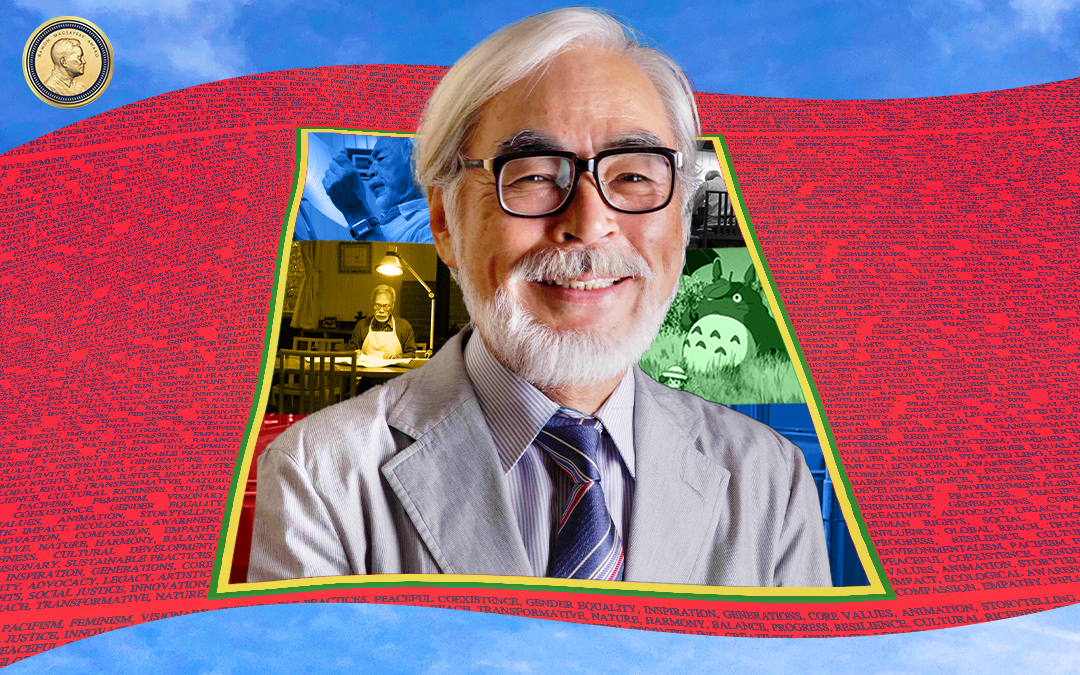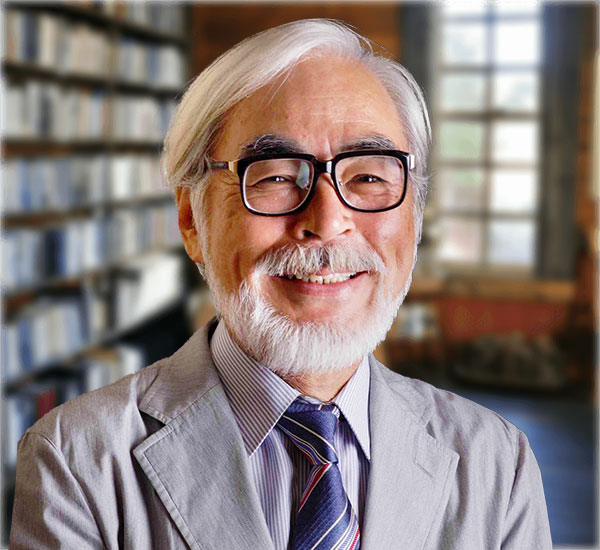- Animation has come into its own as an art form, offering a visual alternative and a recognizable analogue to everyday reality, enabling critical comparisons in an often comic way. MIYAZAKI HAYAO, co-founder of Studio Ghibli, is today one of the industry’s foremost exponents of animated films made expressly for children but with a much broader appeal.
- Founded in 1985, Studio Ghibli has produced many of the world’s most memorable and beloved animated feature films including My Neighbor Totoro (1988), Princess Mononoke (1997), Spirited Away (2001), Howl’s Moving Castle (2004), Ponyo (2008), and The Boy and the Heron (2023). These works display a deep understanding of the human condition, engaging their viewers to reflect on their own situation and exercise their humanity.
- MIYAZAKI and Studio Ghibli have set the bar higher by aiming for a segment of the audience that could be the most difficult to engage and please: children. But MIYAZAKI has never lost his original and main focus: for him, children comprise a clear and critical audience capable of imbibing complex issues if their imaginations can be suitably provoked and directed.
- Reflecting his respect for his young audience, MIYAZAKI does not simplify his plots or stories. He tackles complicated issues, using his art to make them comprehensible to children, whether it be about protecting the environment, advocating for peace, or championing the rights and roles of women in society.
- The RMAF board of trustees recognizes his lifelong commitment to the use of art, specifically animation, to illuminate the human condition, especially lauding his devotion to children as the torchbearers of the imagination, to whom he has passed the light and spark of his own.
Despite being initially looked down upon as “mere entertainment,” animation has come into its own as an art form, indeed among the most popular in the world today. By producing the illusion of motion, early animators brought wonder and delight to audiences wherever it was introduced. It offered a visual alternative—but also a recognizable analogue—to everyday reality, enabling critical comparisons in an often comic way. Over time, animation did more than entertain. It became a useful and effective medium for education.
Today, with the help of artificial intelligence, digital animation has pushed the boundaries of the possible in both positive and negative directions, further blurring the line between illusion and reality. Beyond topics and themes of interest to children, animation now tackles mature and complex subjects, from war and psychosocial trauma to climate change and sustainable development.
For some, animation is a technique, another way of presenting things by cleverly combining art and engineering. For a dedicated few, it is a passion and a way of life, a means of exploring the truth through the magic of visual fiction.
Among those few, one name stands out: that of MIYAZAKI HAYAO (born 1941), the co-founder of Studio Ghibli, today one of the industry’s foremost exponents of animated films made expressly for children but with a much broader appeal.
Founded in 1985, Studio Ghibli has produced many of the world’s most memorable and beloved animated feature films. These include such classics as My Neighbor Totoro (1988), Princess Mononoke (1997), Spirited Away (2001), Howl’s Moving Castle (2004), Ponyo (2008), and The Boy and the Heron (2023). More than being commercial successes—three Ghibli productions are among Japan’s ten top-grossing films—these are works that display a deep understanding of the human condition, engaging their viewers to reflect on their own situation and exercise their humanity.
That could be said of most notable films, except that MIYAZAKI and Studio Ghibli have set the bar higher by aiming for a segment of the audience that could be the most difficult to engage and please: children. Ghibli films have a devoted adult following, but MIYAZAKI has never lost his original and main focus. For him, children comprise a clear and critical audience capable of imbibing complex issues if their imaginations can be suitably provoked and directed.
“I think it is vain to think that we can confront problems of the adult world through animated films,” he says. “That is not to say that films aimed at children are easier; they can be even more difficult because they deal with origins and fundamentals. But I think these are concepts that are especially suited to animation. I want to depict the reality of present-day children in Japan—including their desire—and make films that will inspire heartfelt enjoyment. This is something fundamental, something we should never forget.”
Reflecting his respect for his young audience, MIYAZAKI does not simplify his plots or stories. He tackles complicated issues, using his art to make them comprehensible to children, whether it be about protecting the environment, advocating for peace, or championing the rights and roles of women in society. Some of these subjects can be sensitive and controversial in the context of traditional Japanese society, but MIYAZAKI handles them as a good teacher would—connecting with the young, opening their minds, raising fundamental questions, and inviting them to map the way forward. He educates by entertaining.
As the animator John Lasseter observed in 2014, “Miyazaki has directed eleven feature films [twelve in 2023], more than any other animation director in history. Not only did he write as well as direct those movies, he also drew all of the storyboards, every single drawing for each film himself. And every film he has created is a masterpiece. Each film is full of ideas, images, and emotions that are so immensely creative that it’s hard to conceive that one man thought of them all. Every time I watch a MIYAZAKI movie, I learn something new about the craft of filmmaking.”
But beyond his craft, it is MIYAZAKI’s humanity that has engaged many millions of viewers around the world—his sense of what connects us to nature and to one another. And Studio Ghibli practices what it preaches, as MIYAZAKI has sought to share his success with other workers in the industry, advocating for better working conditions.
In electing MIYAZAKI HAYAO to receive the 2024 Ramon Magsaysay Award, the board of trustees hails a gifted and exemplary artist who has demonstrated, in his work and outlook, a lifelong commitment to the use of art, specifically animation, to illuminate the human condition, especially lauding his devotion to children as the torchbearers of the imagination, to whom he has passed the light and spark of his own.
Honored guests, ladies and gentlemen, good afternoon.
My name is Yoda Kenichi, Vice President for Events and Exhibitions for Studio Ghibli. It is my honor to represent our co-founder Miyazaki Hayao, at the 66th Ramon Magsaysay Awards.
Please allow me to read a letter that Miyazaki-san has written for this occasion.
Letter from Hayao Miyazaki
I first heard of the Ramon Magsaysay Award when I was a child.
I think it was in the school playground, and my teacher told me that such an award had been created.
The name made an impression, so it has remained in my mind ever since.
Being honored with this award made me think of the Philippines once again.
In 2016, the former Emperor and Empress visited Manila, which was the setting of urban warfare during World War II, to pay their respects to thousands who have lost their lives.
The Japanese did a lot of terrible things back then.
They killed many civilians.
The Japanese people must not forget this.
It will always remain.
With such history, I solemnly accept the Ramon Magsaysay Award from the Philippines.
Thank you very much.
Related Articles

Japanese master filmmaker and creative genius Miyazaki Hayao
Sep 5, 2024

